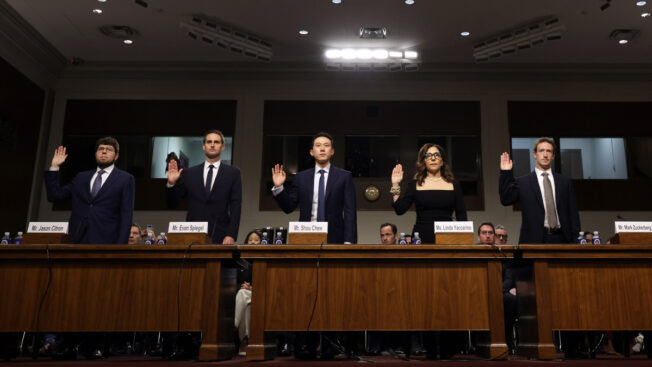What Would a TikTok Ban or Sale Mean for Advertisers?
Introducing the Adweek Podcast Network. Access infinite inspiration in your pocket on everything from career advice and creativity to metaverse marketing and more. Browse all podcasts.
TikTok’s future in the U.S grew more uncertain after the House passed a bipartisan bill Wednesday that would force China-based ByteDance to sell TikTok within 165 days or face a nationwide ban. This comes on the heels of escalating concern in Washington over China’s access to Americans’ data.
Introduced last week, the bill still needs to be cleared by the Senate. Meanwhile, President Joe Biden—who recently joined the app ahead of the 2024 presidential election—said he would sign the bill if passed.
Mounting privacy concerns have sparked a years-long battle over TikTok in the U.S. In 2020, then-president Trump issued an executive order to ban the app over national security concerns. This prompted software giant Oracle to bid for hosting TikTok’s user data as its “trusted technology partner” in the U.S.
“If history tells us anything, it’s very unlikely that a ban will happen,” said Jack Johnston, senior social innovation director at performance marketing agency Tinuiti. “Massive private equity firms in the U.S. have invested into TikTok and ByteDance. If any big action happens, it would be a forced sale.”
It’s ridiculous for Congress to single out one app while failing to act on this huge problem that’s prevalent across all social media.
Jenna Ruddock, policy counsel, Free Press Action
Some brands continue to spend on TikTok, while others are exploring rival platforms such as Meta’s Reels, YouTube Shorts and Snapchat. Still, lingering questions about TikTok’s brand safety, investment requirements, digital audio rights and the possibility of future bans deters brands from spending on TikTok.
“Banning a single platform will not address the problem at the root of the entire tech landscape,” said Jenna Ruddock, policy counsel for media-focused advocacy group Free Press Action, in a statement. “It’s ridiculous for Congress to single out one app while failing to act on this huge problem that’s prevalent across all social media.”
What TikTok divesture entails
If ByteDance agrees to sell TikTok, it’s likely that another technology company will acquire the platform. Former Activision boss Bobby Kotick reportedly expressed interest in buying TikTok earlier this month, and in 2020, Microsoft was in talks to purchase the U.S. operations of the platform.
As a result, TikTok could benefit from the technological capabilities of that company, and vice versa, especially if the platform contains an existing DSP (demand-side platform).
“What that would mean for advertisers is increased inventory and opportunities to buy that media,” said Johnston. “You will probably see decreased costs come onto the platform from direct buys, but more premium ad units and more autonomy.”
Conversely, if users leave the platform and ad buyers pull ad dollars from TikTok, CPMs become more efficient and auctions would be less competitive, said Johnston.
Meta’s Reels and YouTube Shorts are runner-ups
TikTok remains a key focus for brands, driving performance and boosting influencer marketing efforts alongside brand messaging. Ad spend on TikTok reached $1.2 billion in Q4 2023, 43% more than the $805 million spent during Q1 2023, per MediaRadar.
Brand partners at Tinuiti have increased its investment in TikTok by between 10% and 15% year-over-year for the last two to three years.
However, in the event of a renewed call for a nationwide ban, advertisers are expected to shift their ad dollars to platforms where TikTok’s 170 million active users migrate. Meta’s Reels and YouTube Shorts could emerge as alternatives, according to Johnston.
As a result, creators whose primary audience is on TikTok may find themselves in a difficult position if brands decide to allocate their marketing budgets to creators with larger audiences on other platforms.
At media agency Collective Measures, brands are already testing identical ad units offered by Snap, YouTube Shorts and Reels. According to Lauren Beerling, the agency’s director of performance media, Meta emerges as the top performer, as Reels run across Instagram and Facebook, resulting in higher reach.
“There’s been a lot of hesitancy in the marketplace, even with our clients to use TikTok, because of the ever-growing privacy era,” Beerling said. About 4% to 6% of digital ad spend for 2024 is allocated to TikTok.
“TikTok just keeps a lot more under lock and key. They’re willing to share less about how they’re using data,” she said.
Still, no platform quite works like TikTok with its built-in editing tools and unique algorithm, according to Ryan Enoch, svp and director of strategy at Momentum Worldwide.
“While YouTube can have similar effects, the process to create content is more arduous and relies more on search functionality vs. discoverability. Instagram on the other hand requires quite a bit more strategic thought and creative polish in how to connect with and reach audiences vs. TikTok,” he said.
Call for federal privacy law
A ban on TikTok could lead to more market share for American social media companies despite having nearly the same brand safety and data accessibility issues as TikTok.
Many social media services make their money in part by harvesting user data, and so—to some degree—many of these services present some of the same concerns for misuse of user data as TikTok does, according to Kate Ruane, director of the Center for Democracy and Technology’s Free Expression Project.
“The ultimate solution is to pass strong consumer privacy protections that also create strong protections against any government’s access to data collected by companies like TikTok and beyond,” she said.
https://www.adweek.com/programmatic/tiktok-ban-sale-advertisers/
